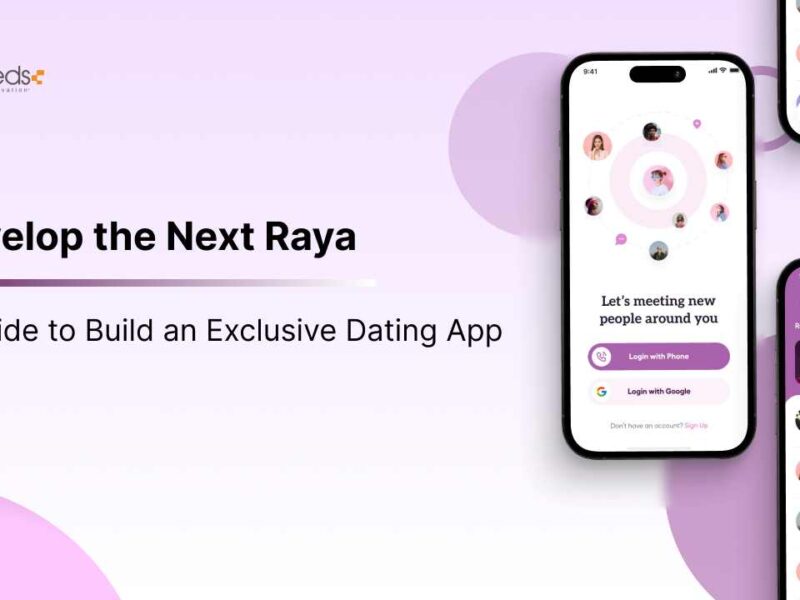Healthcare app development is advancing quickly, and there are numerous innovative solutions on the market that people use for their health and professionals use to provide the best healthcare services to people. Most people search for healthcare management online, where mobile apps play a crucial role.
If you are one of the businesses looking to develop a HIPAA Compliant App, then first you need to understand the concept of it.
- What is HIPAA Compliance?
- How does it work?
- How to develop a HIPAA Compliant App
And more.
Developers, application owners, and healthcare organizations need to be aware of the regulations in place for HIPAA compliance. This is especially true when it comes to mobile applications that are designed to store or handle protected health information.
If you are looking for help with your HIPAA Compliant app development project, then this complete guide can help you the best.
When it comes to HIPAA-compliant mobile app development, there are three main concerns – privacy of the data, security of the data, and retention of data. The most important consideration is safeguarding access to sensitive information that your app may handle.
To do this, you need a strong layer of encryption, such as TLS or SSL. You also need to keep physical copies of any documentation about how the data was collected and how it will be handled.
Finally, you want to ensure that individuals have the ability to opt-out of your application if they choose and that their decisions are respected when they do.
What is HIPAA?
HIPAA (Health Insurance Portability and Accountability Act) was passed by the United States Congress in 1996, aiming to protect individuals’ health insurance coverage when they change or lose their jobs.
This act also set out certain rules regarding the use and disclosure of protected health information and gave patients greater access to their own health information.
It establishes national standards to protect individuals’ medical records and other personal health information and covers all types of healthcare providers who transmit any health information in electronic form.
HIPAA has strict guidelines on the use of data encryption and storage, which can be used in conjunction with mobile apps developed to be compliant with HIPAA privacy regulations.
With the help of this complete guide, you will learn how to develop an app that is both HIPAA compliant as well as secure against hackers.
The HIPAA Privacy Rule governs how protected health information can be used or disclosed by covered entities, which are defined as health plans, health care clearinghouses, and health care providers that transmit any health information in electronic form in connection with certain transactions covered by the rule.
As technology advances and mobile apps become more integrated into our daily lives, these guidelines must be applied to the world of app development as well.
Key Stats of Healthcare App Development


For a deeper understanding of how to develop HIPAA-compliant apps, you must know about the healthcare app development statistics. These figures represent the growth of healthcare and medical apps and will inspire you to contribute.
- Nutrition Apps (43%), out of the entire category of healthcare apps, has the highest percentage of HIPAA Compliant apps downloaded
- Healthcare apps are being used by 18-64 age groups
- India(70%) and China(66%) are the leading countries in using healthcare apps
- Till Q3-2022, there are 54,546 healthcare apps available on Google Play Store
Why Is HIPAA Compliance Beneficial to Healthcare App Development?
The HIPAA Privacy Rule limits the use and disclosure of an individual’s health information without their consent. It also sets rules about how patients can access their medical records.
The U.S. Department of Health and Human Services has a set of guidelines called a privacy rule which regulates how personal data may be used by healthcare web development services or other covered entities.
Covered entities must not disclose any personal data obtained through their work with you or your family members unless they obtain your authorization to do so or they meet one or more exceptions under the HIPAA Privacy Rule.
The HIPAA Security Rule covers topics such as physical security measures, technical safeguards, personnel training programs, disaster recovery procedures, and policies for system users who violate security policies.
A HIPAA-compliant app will not share any patient data with any third parties, including advertisers, unless the patient has given explicit consent. In addition, a HIPAA-compliant app will not use any data for anything other than providing services for the patient or managing their care.
If you want to create a HIPAA-compliant app for your company, you should use mobile app development services from a company or experts who specialise in on-demand doctor app development.
The Benefits of Developing a HIPAA-Compliant App for Business
Developing a HIPAA-compliant app can help reduce the risk of data breaches, increase privacy for patients and staff, enable remote access to medical records for healthcare providers, and improve patient care with faster communication.
That’s why hiring an on-demand app development company is so important. Hiring healthcare app developers ensure that your business is following the law and ensures that patients are protected from potential fraud.
They can provide you with the expertise to create a HIPAA Compliant mobile app that meets your needs while keeping all parties safe.
How to Develop a HIPAA-Compliant App
With the increased risk of hacking and the increase in data breach incidents, more people are concerned about their medical privacy. However, there’s good news. It’s possible to develop a HIPAA Compliant app!
There are many considerations that need to be made when developing an app that meets this standard, including what type of encryption is used and how passwords are stored.
In order for your company to succeed, it needs mobile app developers with experience in developing a professional healthcare app,who is an expert in both Android Application Development Services and iOS Application Development Services.
When it comes to developing a new app, there are a lot of factors to consider. But if you’re handling health information, there’s one factor that trumps them all: compliance with the Health Insurance Portability and Accountability Act (HIPAA).
Here are some crucial steps that you need to follow while developing a HIPAA Compliant App


#1. Choose a secure development platform
The first step to developing a HIPAA Compliant app is choosing a secure development platform. This ensures that all of the software and systems your app will be built on are secure and up-to-date.
#2. Design with security in mind
When you’re designing your app, security should be top-of-mind. You’ll need to consider things like user authentication, data encryption, and access control.
#3. Implement strong security measures
Once you’ve designed your app with security in mind, it’s time to start implementing strong security measures. This includes things like user authentication, data encryption, and access control.
#4. Test regularly and monitor constantly
The final step to developing a HIPAA Compliant app is to test regularly and monitor constantly. This helps to ensure that your app is always up-to-date and compliant with the latest security standards.
What You Need To Keep In Mind For HIPAA Compliant App Development?
Here are some points that you need to keep in mind while creating HIPAA-compliant healthcare app development.
#1. Establish a business associate agreement (BAA)
If you’re handling health information, you need to have a business associate agreement (BAA) in place. A BAA is a contract between you and a third party that outlines how the information will be used and safeguarded. Without a BAA, you could be violating HIPAA.
#2. Keep data secure
HIPAA requires that all health information be kept secure. That means using strong encryption to protect data in transit and at rest. It also means using appropriate physical and administrative safeguards to prevent unauthorized access to data.
#3. Only use data for its intended purpose
HIPAA requires that health information only be used for its intended purpose. That means you can’t use it for marketing or other purposes without the patient’s explicit permission.
#4. Give patients access to their data
HIPAA gives patients the right to access their own health information. That means you need to have a way for patients to log in and view their data. You also need to provide them with a way to download their data in a format that they can use.
#5. Allow patients to correct their data
If a patient believes that their medical records are inaccurate, they should be able to correct them. This is important for a few reasons. First, accurate medical records are essential for making sure that patients receive the best possible care.
If a doctor does not have accurate information about a patient’s medical history, they could make a mistake that could have serious consequences.
How Much Does It Cost to Develop A HIPAA Compliant App?
When it comes to developing a HIPAA-compliant app, the cost can vary depending on feature requirements, project size, and other considerations. However, you can typically expect to spend between $15,000 and $50,000 on development.
While the cost of compliance is an important factor to consider, it’s not the only thing to keep in mind when building a HIPAA-compliant app. Security and privacy requirements must also be met in order to create a truly compliant app.
The Final Thoughts
Developing a HIPAA compliant is a great idea for businesses, but it must be implemented properly in order to meet expectations. For your information, we have created this guide that you can refer to develop a fine app with the help of a healthcare app development services provider. There are some key points that you need to remember are –
- Make sure that all data is encrypted.
- Ensure that there are strict controls in place to prevent unauthorized access.
- Make sure that all PHI is stored on a secure server.
- Have a comprehensive security policy in place.
An app’s ability to function securely and protect PHI is critical to HIPAA compliance. When developing a new app or updating an existing one, make sure to keep these considerations in mind.



Naveen Khanna is the CEO of eBizneeds, a company renowned for its bespoke web and mobile app development. By delivering high-end modern solutions all over the globe, Naveen takes pleasure in sharing his rich experiences and views on emerging technological trends. He has worked in many domains, from education, entertainment, banking, manufacturing, healthcare, and real estate, sharing rich experience in delivering innovative solutions.





